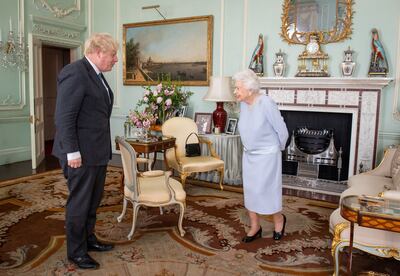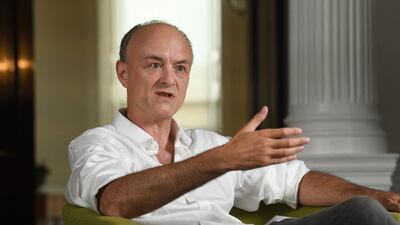As the architect of British Prime Minister Boris Johnson’s historic triumph in the 2016 Brexit referendum, as well as helping him to win a landslide victory in the 2019 general election, political guru Dominic Cummings has been at the heart of some of the most tumultuous events in modern UK.
It is for this reason that, following his spectacular falling out with Mr Johnson last year at the height of the coronavirus pandemic, Mr Cummings's obsession with making public his views of his former employer has become one of the most compelling soap operas to hit the country's politics for some time.
At the heart of his personal assault is a burning desire to avenge what he believes was his grossly unfair dismissal from his key role in the Johnson government last November. Mr Cummings was regarded in some Conservative party circles as a "Rasputin" figure in Mr Johnson’s inner circle. He suffered the humiliation of leaving through the No 10 Downing Street front door carrying his personal belongings in a cardboard box, after Mr Johnson had accused him of being disloyal.
Mr Johnson was angered by reports that Mr Cummings had been critical over what he regarded as the prime minister’s indecisiveness in handling the pandemic. This was at a time when Mr Johnson was struggling to contain the second wave to hit Britain last autumn. Relations had also soured between Mr Cummings and Carrie Symonds, who was Mr Johnson’s partner at the time – the couple married earlier in the summer – and exercised significant influence in Downing Street herself.
Ms Symonds was said to resent Mr Cummings's excessive influence in Downing Street and his opposition to her efforts to appoint her own allies to key roles in the government. The simmering tensions eventually culminated in a blazing row between Mr Johnson and Mr Cummings in the prime minister’s private office one afternoon in November, resulting in the adviser’s summary dismissal.
The depth of Mr Cummings’s disdain for the British leader was graphically laid bare this week when, during a one-hour television interview with the BBC, he gave an astonishing account of what life is like in Downing Street under Mr Johnson’s leadership. One of the major sources of contention was Mr Johnson’s reluctance to authorise a second lockdown last year over his concern it would damage the economy.
The former adviser alleges that Mr Johnson had wanted to let Covid-19 "wash through the country" rather than destroy the economy. He claims the prime minister was dubious about claims that the pandemic would overwhelm Britain’s National Health Service (NHS), at one point sending a WhatsApp message stating: “I no longer buy all this NHS overwhelmed stuff.” Mr Johnson is also accused of a somewhat hard-hearted view of the probable impact of the virus on the elderly, claiming there was no need to tighten restrictions because people dying from the virus were “all essentially over 80".
Not all of Mr Cummings’s criticisms were focused solely on pandemic policy.
In one of the more outrageous claims, Mr Cummings alleges that Mr Johnson risked putting Queen Elizabeth II’s life in danger by maintaining his weekly face-to-face meetings with the 95-year-old monarch at the start of the outbreak. In the interview, Mr Cummings recalls telling the prime minister: “What if you go and see her and give the Queen coronavirus? You obviously can't go. If you give her coronavirus and she dies, what are you going to [do]? You can't do that. You can't risk that. That's completely insane.”

Unsurprisingly, Downing Street officials have acted quickly to dismiss these allegations, insisting that the prime minister had taken “the necessary action to protect lives and livelihoods, guided by the best scientific advice". They also re-emphasised the point that, as a result of Mr Johnson’s leadership, the government had prevented the NHS “from being overwhelmed through three national lockdowns".
While Mr Cummings’s explosive claims make for good political drama, the former adviser’s almost maniacal desire to destroy the reputation of his former boss has left many observers questioning whether his actions are designed to expose important flaws in the running of the government or merely an attempt to settle old scores.
Certainly, his extraordinary claim that, within days of Mr Johnson winning the 2019 election, he and his allies were plotting to remove Britain’s new democratically elected prime minister from office points to the latter – and to Mr Cummings’s disregard for the constitutional process. “The more he spoke, the more he resembled a crazed cult leader, as he revealed his grandiose plans to overthrow the system,” The Daily Telegraph's Gordon Rayner, a prominent political commentator, wrote of Mr Cummings following the broadcast.
Moreover, questions persist about Mr Cummings’s own judgement during the pandemic following his now infamous trip to Durham’s Barnard Castle to “test his eyesight” before driving more than 400 kilometres to London – acts both of which constituted blatant breaches of the lockdown restrictions in place at the time.
It is unlikely that any of Mr Cummings's allegations will have any lasting impact on Mr Johnson’s premiership. The most telling indicator of this is the fact that, on the day the BBC interview aired, Mr Johnson’s ratings rose by a further two per cent in the opinion polls.


